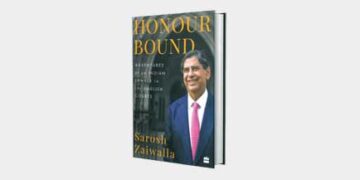My world crumbles
Despite its turbulent start, Renoo and I had what could be termed a happy marriage. Once the children came along life was fun and we were a close-knit family. Despite being an outsider, I was achieving considerable success in the mainstream British legal profession.
Renoo was a great mother to our children. We both wanted them to attend the best schools and be educated privately. So our son went to King’s College School, and our daughter to Putney High. We had three or four brief holidays a year in places like Austria, Croatia, Ireland and Switzerland. Every winter we would go to India to see our parents. At our home we had a butler and an ayah, who apart from helping look after the children also did the cooking. We were very content.
Or so I thought.
In April 1992, Renoo demanded a divorce, telling me she wanted to lead an independent life. She told me she wanted me to move out of the matrimonial house. This came out of the blue for me without any prior hint or discussions. I was devastated and went into an utter state of shock. I visited a nearby church in Wimbledon by myself in those days and just sat there, not knowing what to do. I wouldn’t make a scene at home with the children around. I made the mistake of never telling anyone. Although I knew so many people, I felt they were acquaintances and not the true friends I could share my pain with.
In August 1992, instead of going with the family on our annual two-week summer holiday in Austria and Croatia, I was by myself in Delhi at the Oberoi Hotel. I started suffering from a severe irregular heartbeat and I had difficulty breathing. The hotel called a doctor, who referred me to the Gupta Nursing Home, where I was given injections to attempt to stabilize my heart. Just after midnight the doctor told me that I might not survive the night and advised me to leave a note for my family. Instead I just prayed. I prayed to God to look after my children and guide them. I found I was not afraid of death. I found out how important my faith is. This was a life-changing moment. As Bahau’llah, founder of the Baha’i faith, said as his first counsel, ‘Possess a pure, kindly and radiant heart, that thine may be a sovereignty ancient, imperishable and everlasting.” 525 The Hidden Words of Bahau’llah, Bahai Publishing Trust, 1949 Bollywood, Bach chans and Consequential Damage 101
This will connect any individual with God. Religion is only a label. God is Divine energy. In the morning the first person to visit me was Murli Deora, an Indian MP from my original home city of Mumbai, whom I had got to know well as a result of Bofors and who later became petroleum minister in Dr Manmohan Singh’s government. The Oberoi had told him where I was, and he came running to see me. He also told my brothers, who came from Mumbai. The next day Amar Singh, who later became a leading politician, arranged for me to be taken to Escorts Hospital, a specialist heart centre. There I was treated by Dr Naresh Trehan, one of India’s top cardiologists. I was admitted to the intensive cardiac care unit and was there for seven days. My confidence and my health both seemed shattered and I was left feeling weak and embarrassed.
When news of my divorce came out, which had become very acrimonious towards the end, those who I believed were jealous of me became a part of my ex-wife’s support group, attacking me publicly and damaging the good standing I had worked so very hard to achieve. Disinformation was spread that I was having an affair with Ajitabh’s wife Ramola. This was wholly untrue. I had no affairs during my marriage. It is often said that law is a jealous mistress. Once you are involved with law, there is no room for anyone else.
I became something of a recluse for some time. I would work hard at the office and stay late before going home. I bottled up my emotions, unable to shout or scream like some can. It was a horrible time. Farokh Udwadia, an eminent Mumbai-based physician and a distant relative, advised me to keep reciting the Zoroastrian prayers Ashem Vohu, which in English translates to: In righteousness lies real happiness. It is God’s finest gift. Happy is he who is righteous for righteousness sake. I also took the advice of a cardiac consultant in London to take up transcendental meditation.
My association with the Bachchans had one more surprise in store for me. In 1997, more details finally emerged about the possible source of the $15 million. I learnt through a source close to Gopi Hinduja that the money had allegedly come from Congress party funds, which were entrusted to Ajitabh.
This means that I was lied to. I was furious. I rushed to Delhi to discuss this with Sonia Gandhi. I got to know her well only after Rajiv’s death. We were introduced by Murli Deora at a party he hosted in Mumbai for Mark Tully, the legendary BBC correspondent.
I was impressed with Sonia. She spoke well, was likeable and sincere. The first time I went to call on her after Rajiv’s passing away, she said, ‘Rajivji had so much regard for you. He liked you very much. Rajivji was always talking very highly of you. I would like you to become a Rajiv Gandhi Foundation trustee.’ When I suggested it would be better if she got somebody in India for this purpose, she was not upset, and I continued to go to her official residence at 10 Janpath to see her. But following the revelation about the source of the $15 million, this was not a social call.
When I was fighting the Bachchans’ libel case, I perhaps did not appreciate quite how crucial a matter the Bofors scandal was for the Congress. It had cost Rajiv the 1989 general election. By winning the libel action and establishing that Rajiv had received no kickback, I had helped rescue the party’s reputation. Most people now accepted he was innocent, and he was on the verge of returning to power in 1991 when he was assassinated. That is why Ajitabh had received the money from the party’s funds to give to me as a reward.
But he didn’t tell me this, insisted it was Bachchan money and, of course, never gave it to me in any case. When I conveyed all this to Sonia, she was visibly upset but remained silent.
As I left 10 Janpath, I saw why Ajitabh had always tried to keep me away from Sonia, including preventing Renoo and me from attending a reception hosted by Prince Charles at St. James Palace for her when she was visiting London after Rajiv’s death. He claimed it was the high commissioner who drew up the guest list, but he wanted to stop me getting to know Sonia personally. He was keeping me away.
In the days that followed my meeting, I drew comfort that although I never did get the money Ajitabh had obtained, at least I had done the right thing in sharing the information with Sonia.
I had no intentions of punishing the Bachchans. If the source of the $15 million was corrupt political funds, then I was glad I did not receive it. Throughout my life I have firmly believed in forgiveness and to leave punishment to the universe. I was also never after easy money.
Two weeks after our meeting, I read reports published in India, that Sonia and the Bachchans had fallen out. It was clear to me that what I told her had led directly to her breaking relations with them.
The Bofors saga had also entangled me in a political uproar in India, with my name bandied about in Parliament.
Rene Felber, the Swiss foreign minister, leaked a memo to a journalist that had been handed to him by his Indian counterpart, Madhavsinh Solanki. This note recommended to the Swiss government that it close its inquiry into the Bofors kickbacks. When this news reached India, Solanki admitted in Parliament that he was given a sealed envelope to give to Felber, but said he was unaware it contained a Bofors memo.
Solanki further elaborated he was in his seat on the plane when a well-respected Indian lawyer in London gave him the envelope and requested him to give it to the Swiss foreign minister.
There was a presumption in the Indian press that this lawyer was me. Naturally, the Indian parliament raised questions about the propriety of its foreign minister carrying a sealed envelope, without knowing its contents.
I knew nothing about it. There was no way I would have got security clearance to board a plane on which I was not travelling, let alone deliver anything to anyone in it. To find my name being baselessly flung around in the Indian parliament and press was stressful and it was the kind of publicity I could do without.
The final chapter of the saga came out in Mumbai around 2010, some two decades after it had started. Mehernosh had returned to India with his family. I was visiting Mumbai when a common friend of mine, Suresh Mankad of P&I Services India, told me Mehernosh wanted to see me. It was the first time we had spoken since our acrimonious split over Delta Shipping Company. Over lunch at the Oberoi Hotel, which Mehernosh hosted, although I wasn’t aware of it, Mehernosh must have known he was terminally ill. He said sorry for what had happened between us. I accepted the apology but asked what happened to the money. He told me Ajitabh had lost $500,000 of it but had kept the remaining $14.5 million.
He added, ‘Has Ajitabh not told you that he took back $14.5 million?’ I had cleared Ajitabh Bachchan’s name, but, if what Mehernosh said was true, it was he who profited so handsomely. Meanwhile I had lost my work with the Indian government which I cherished.
Now I had to start all over again. It was China, India’s northern neighbour and rival, which would help revive me and my career.
Panama Papers post-script
Perhaps significantly, Amitabh Bachchan has in 2017 faced questions on Indian television about his involvement in the Panama Papers.
This episode involved the leak to the press of sensitive files containing incriminating confidential information about a number of high- profile overseas companies. This has led, among other outcomes, to the former Pakistan prime minister, Nawaz Sharif, being sent to jail consequent on information obtained in the papers by the Pakistani government. Amitabh’s name featured in the Panama Papers in a way which suggested that he was involved in purchasing ocean-going vessels through Panama companies (although I am not aware of the truth of Amitabh’s involvement in this).
The only time Amitabh and I had a serious meeting of any sort about the Delta Shipping project was at the instance of Ajitabh, who had told me that Amitabh needed to be briefed. While on way to holiday with my family in Goa in 1992, I had stopped over in Delhi to meet Amitabh briefly to discuss the project and its profitability.


















